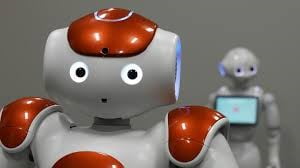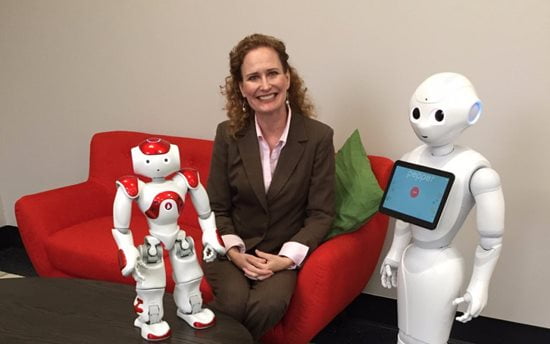
NAO
NAO is an interactive companion robot currently being used to speak Shakespeare to older adults for psychological well-being! Currently UTA owns the 5th version, and about 10,000 NAO have already been sold throughout the world.
The Emotional Robotics Living Lab (ERLL) began in 2019 as a unique theatre-based research space dedicated to exploring the intersection of theatre arts and social robotics. Originally established by Assistant Professor Dr. Julienne A. Greer, the lab brought together performance techniques—such as voice, movement, and character development—with robotics programming to create emotionally engaging, socially skilled robot companions like NAO and Pepper.
Over time, the lab has evolved into an interdisciplinary research initiative now housed within the School of Social Work at The University of Texas at Arlington, under the leadership of Drs. Ling Xu and Noelle Fields. Today, ERLL focuses on advancing socially assistive robotics (SAR) to address critical issues in aging and caregiving, including dementia support, caregiver respite, and intergenerational storytelling. Building on its theatrical origins, the lab continues to apply human-centered and emotionally expressive approaches to robot design while partnering with community organizations to ensure real-world relevance and ethical impact.

At the Emotional Robotics Living Lab (ERLL), we focus on real-world applications where technology meets compassion. The lab is grounded in human-centered design and human-robot interaction (HRI) methodologies to support the well-being of individuals across the lifespan. ERLL explores the transformative potential of socially assistive robots (SAR) to support individuals in therapeutic, research, and caregiving contexts.
The lab is co-led by Dr. Xu and Dr. Fields, nationally recognized dementia care researchers with extensive experience in dyadic psychosocial intervention development and evaluation. Their work includes a peer-reviewed study using an arts-based SAR intervention and the use of SAR for family caregiver respite.
The applications for the robots are numerous, including dementia care, caregiver respite, and social learning. Each of these applications is developed through ethical, community-engaged research practices that prioritize inclusivity, dignity, and real-world relevance, ensuring that our technology meets the diverse needs of the populations we serve.
The Emotional Robotics Living Lab (ERLL) envisions a future where social work and technology converge to enhance human well-being across the lifespan, preserve personal and cultural memory, empower caregivers and frontline workers, and expand the role of ethical, empathetic technology in aging and social services.

Research Interests: Aging, grandparents, ethnicity (Chinese), assistive technology, Intergenerational Support and Healthy Aging, Health Disparity, Health Care Utilization, Acculturative Stress, Social support and Well-being of Older Adults, Asian American Older Adults

Research Interests: Aging in Place, Home and Community-based Services, Family Caregiving, Alzheimer’s Disease and Related Dementia, Assistive Technology, Transportation Equity
NAO is an interactive companion robot currently being used to speak Shakespeare to older adults for psychological well-being! Currently UTA owns the 5th version, and about 10,000 NAO have already been sold throughout the world.
Pepper is a human-shaped robot. He is kind, endearing and surprising. Softbank Robotics designed Pepper to be a genuine day-to-day companion, whose number one quality is his ability to perceive emotions.
